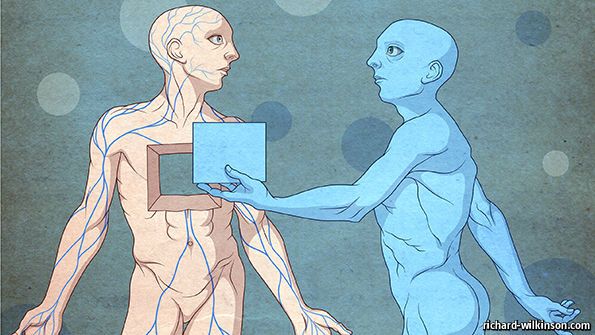Archive for the ‘human trajectories’ category: Page 3
Jul 4, 2017
Learning the Human Game — Alan Watts
Posted by Odette Bohr Dienel in category: human trajectories
Mar 14, 2017
What Happened When I Gave Up Gluten, Sugar, Dairy, And Coffee — By Stephanie Pizza | Fast Company
Posted by Odette Bohr Dienel in categories: food, fun, health, human trajectories, life extension, science
Oct 11, 2016
Brexit for Transhumanists: A Parable of Getting What You Wish For
Posted by Steve Fuller in categories: governance, government, human trajectories, humor, life extension, Ray Kurzweil, transhumanism
For the past two years, Zoltan Istvan has been campaigning for the US presidency on the Transhumanist Party, a largely one-man show which nevertheless remains faithful to the basic tenets of transhumanism. Now suppose he won. Top of his policy agenda had been to ensure the immortality of all Americans. But even Zoltan realized that this would entail quite big changes in how the state and society function. So, shortly after being elected president, he decides to hold a national referendum on the matter.
The question on the ballot is one that makes the stakes crystal clear: ‘The government shall endeavour to release all Americans from the constraints of mortality’. Zoltan liked this way of putting things because were he to lose to the referendum, which he half-presumed, the opportunity to air publicly the relevant issues would continue to shift naysayers in Congress to increase funding for broadly anti-death research and treatments — a step in the right direction, as far as he’s concerned.
Zoltan also liked the idea that the referendum effectively ‘rotated the political axis’, from left-right to up-down, a turn of phrase he picked up from some philosopher whose name he couldn’t remember. But this also meant that the ensuing campaign, which was fierce, attracted a motley crew of supporters on both sides.
The ‘Remainers’ (as the anti-immortalists call themselves) were composed of a mix of traditional religious believers, environmental activists and hard-headed sceptics who distrust all transcendental hype, whether it comes from religion or science. In other words, those who wanted us to remain in our normal bodies held that our fate either is confined to our current circumstances or requires that we remain in those circumstances in order for something better to happen post mortem. The stakes were so high that even the Pope was called out to argue the case, which of course he was more than happy to do, Obama-style.
Continue reading “Brexit for Transhumanists: A Parable of Getting What You Wish For” »
Jul 16, 2016
Beware the Rise of Gerontocracy: Some Hard Lessons for Transhumanism, Not Least from Brexit
Posted by Steve Fuller in categories: aging, biological, ethics, futurism, governance, government, homo sapiens, human trajectories, life extension, neuroscience, policy, strategy, thought controlled, transhumanism
Transhumanists will know that the science fiction author Zoltan Istvan has unilaterally leveraged the movement into a political party contesting the 2016 US presidential election. To be sure, many transhumanists have contested Istvan’s own legitimacy, but there is no denying that he has generated enormous publicity for many key transhumanist ideas. Interestingly, his lead idea is that the state should do everything possible to uphold people’s right to live forever. Of course, he means to live forever in a healthy state, fit of mind and body. Istvan cleverly couches this policy as simply an extension of what voters already expect from medical research and welfare provision. And while he may be correct, the policy is fraught with hazards – especially if, as many transhumanists believe, we are on the verge of revealing the secrets to biological immortality.
In June, Istvan and I debated this matter at Brain Bar Budapest. Let me say, for the record, that I think that we are sufficiently close to this prospect that it is not too early to discuss its political and economic implications.
Two months before my encounter with Istvan, I was on a panel at the Edinburgh Science Festival with the great theorist of radical life extension Aubrey de Grey, where he declared that people who live indefinitely will seem like renovated vintage cars. Whatever else, he is suggesting that they would be frozen in time. He may actually be right about this. But is such a state desirable, given that throughout history radical change has been facilitated generational change? Specifically, two simple facts make the young open to doing things differently: The young have no memory of past practices working to anyone else’s benefit, and they have not had the time to invest in those practices to reap their benefits. Whatever good is to be found in the past is hearsay, as far as the young are concerned, which they are being asked to trust as they enter a world that they know is bound to change.
Questions have been already raised about whether tomorrow’s Methuselahs will wish to procreate at all, given the time available to them to realize dreams that in the past would have been transferred to their offspring. After all, as human life expectancy has increased 50% over the past century, the birth rate has correspondingly dropped. One can only imagine what will happen once ageing can be arrested, if not outright reversed!
Jul 1, 2016
What the evolution of human culture can teach us about international relations — By Mark Leon Goldberg | UN Dispatch
Posted by Odette Bohr Dienel in category: human trajectories
An interview with Stewart Patrick, “a Senior Fellow and Director of the International Institutions and Global Governance Program at the Council on Foreign Relations.”
Tags: culture, United Nations
May 5, 2016
“Liberation technologies” and the ones who will gain
Posted by Harry J. Bentham in categories: 3D printing, biological, biotech/medical, disruptive technology, economics, futurism, governance, human trajectories, internet, scientific freedom

How could global economic inequality survive the onslaught of synthetic organisms, micromanufacturing devices, additive manufacturing machines, nano-factories?
(http://www.beliefnet.com/columnists/lordre/2016/04/obsessed-…L36KMDo.99)
Narrated by Harry J. Bentham, author of Catalyst: A Techno-Liberation Thesis (2013), using the introduction from that book as a taster of the audio version of the book in production. (http://www.clubof.info/2016/04/liberation-technologies-to-come.html)
Continue reading “"Liberation technologies" and the ones who will gain” »
Mar 21, 2016
Resurrection and Biotechnology
Posted by Ira S. Pastor in categories: biotech/medical, disruptive technology, Elon Musk, futurism, human trajectories, neuroscience, posthumanism, Ray Kurzweil, Skynet, transhumanism
“He is not here; He has risen,” — Matthew 28:6
As billions of Christians around the world are getting ready to celebrate the Easter festival and holiday, we take pause to appreciate the awe inspiring phenomena of resurrection.
In religious and mythological contexts, in both Western and Eastern societies, well known and less common names appear, such as Attis, Dionysus, Ganesha, Krishna, Lemminkainen, Odin, Osiris, Persephone, Quetzalcoatl, and Tammuz, all of whom were reborn again in the spark of the divine.
Tags: aging, aging research, Bill Gates, biotech, biotechnology, brain death, Death, Elon Musk, evolution, God, Google, human evolution, immortalism, immortality, matrix, Neuroscience, past lives, posthumanism, Ray Kurzweil, reanimation, rejuvenation, Religion, Remote sensing, resurrection, savantism, skynet, Stephen Hawking, transhumanism, vatican, wearables
Feb 4, 2016
Astronauts and Arugula: Using Space-Station Technology to Grow Food — By Davina van Buren | Modern Farmer / smithsonian.com
Posted by Odette Bohr Dienel in categories: human trajectories, science, space, space travel
“Unlike other vertical farms that use market-ready technology, Romano developed Infinite Harvest’s proprietary building management system from the ground up, using his knowledge of space habitat design.
Tags: Agriculture, Vertical farm
Feb 4, 2016
Wait not in vain | The Economist
Posted by Odette Bohr Dienel in categories: business, cryonics, human trajectories, science
“After decades of piecemeal progress, the science of cryogenically storing human organs is warming up”














